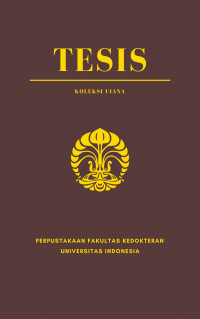Tesis
Dampak Pemberian Glutamin Intravena Menurunkan Gangguan Fungsi Ginjal Pada Bedah Pintas Arteri Koroner Dengan Fraksi Ejeksi Rendah Menggunakan Mesin Pintas Jantung Paru = Impact of Intravenous Glutamine in Reducing Kidney Function Disorders in Coronary Artery Bypass Graft Surgery with Low Ejection Fraction and Using Cardiopulmonary Bypass Machine.
Latar Belakang: Penyakit arteri koroner dapat di tata laksana dengan bedah pintas arteri koroner (BPAK) menggunakan mesin pintas jantung paru (PJP) dan fraksi ejeksi (FE) yang rendah berhubungan dengan peningkatan mortalitas jangka pendek dan jangka panjang. Kejadian AKI pascaoperasi BPAK dengan mesin PJP merupakan kejadian yang cukup sering dengan prevalensi bervariasi antara 7,6-48,5%. Patogenesis acute kidney injury(AKI) pascaoperasi jantung bersifat kompleks dan multifaktorial, dengan beberapa mekanismenya melibatkan proses inflamasi, iskemia-cedera reperfusi, dan stres oksidatif. Hingga saat ini belum ada pedoman strategi proteksi ginjal pada operasi BPAK. Glutamin, sebuah asam amino esensial-kondisional memiliki efek anti inflamasi dan anti oksidena melalui induksi heat shock protein (HSP) dan produksi antioksidan glutathione (GSH). Sehingga, dihipotesiskan pemberian glutamin dapat menurunkan kejadian AKI menurunkan gangguan fungsi ginjal pascaoperasi BPAK. Metodologi: Penelitian ini merupakan penelitian kohort retrospektif pada pasien yang menjalani operasi BPAK menggunakan mesin PJP dengan FE rendah. Subjek dibagi menjadi kelompok yang mendapat glutamin intravena praoperasi dan kelompok yang tidak mendapat glutamin. Kejadian AKI 24 jam pascaoperasi, kadar kreatinin serum 24 jam pascaoperasi dan estimated glomerular filtration rate(eGFR) 24 jam pascaoperasi merupakan luaran yang dinilai pada penelitian ini. Hasil: Dari hasil penelitian didapatkan kejadian AKI 24 jam pascoperasi pada kelompok glutamin sebesar 3,3% dan kelompok kontrol 10%. Namun, tidak didapatkan hubungan bermakan kejadian AKI 24 jam pascaoperasi terhadap pemberian glutamin intravena praoperasi (p=0,612). Dari hasil pemeriksaan eGFR 24 jam pascaoperasi, didapatkan rerata kelompok kontrol 57,67 ± 18,86 mL/min/1,73m 2 dan kelompok glutamin 64,43 ± 17,56 mL/min/1,73m 2 , namun tidak berbeda bermakna (p=0,156). Dari hasil pemeriksaann kreatinin serum 24 jam pascaoperasi, didapatkan median kelompok kontrol 1,3 (0,87 – 2,68) mg/dL dan kelompok glutamin 1,2 (0,78 – 2,35), namun hasil ini juga tidak berbeda bermakna (p=0,258) Kesimpulan: Pemberian glutamin intravena praoperasi pada pasien dengan fraksi ejeksi rendah yang menjalani BPAK menggunakan mesin PJP, tidak memiliki hubunga bermakna terhadap kejadian AKI dan eGFR serta kadar kreatinin serum 24 jam pascaoperasi.
Kata Kunci: bedah pintas arteri koroner, glutamin, acute kidney injury,estimated glomerular filtration rate, kreatinin
Background: Coronary artery disease can be managed by coronary artery bypass graft surgery (CABG) using a cardiopulmonary machine (CPB) and low ejection fraction (FE) is associated with increased short-term and long-term mortality. The incidence of postoperative acute kidney injury (AKI) after CABG using a CPB machine is quite common with a prevalence varying between 7.6-48.5%. The pathogenesis AKI after cardiac surgery is complex and multifactorial, with several mechanisms involving inflammation, ischemia-reperfusion injury, and oxidative stress. Until now, there are no guidelines for kidney protection strategies in CABG surgery. Glutamine, a conditionally essential amino acid has anti-inflammatory and anti-oxidant effects through the induction of heat shock protein (HSP) and the production of the antioxidant glutathione (GSH). Thus, it is hypothesized that the administration of glutamine can reduce the incidence of AKI and decrease renal function impairment after CABG surgery. Methods: This study is a retrospective cohort study in patients who underwent CPA surgery using a PJP machine with low FE. Subjects were divided into groups that received preoperative intravenous glutamine and groups that did not receive glutamine. The incidence of AKI 24 hours postoperatively, serum creatinine levels 24 hours postoperatively and the estimated glomerular filtration rate (eGFR) 24 hours postoperatively were the outcomes assessed in this study. Results:From this study, the incidence of AKI 24 hours postoperatively in the glutamine group was 3.3% and the control group was 10%. However, there was no significant relationship between the incidence of AKI 24 hours postoperatively with preoperative intravenous glutamine administration (p=0.612). From the results of the 24-hour postoperative eGFR examination, the mean of the control group was 57.67 ± 18.86 mL/min/1.73m 2 and the glutamine group was 64.43 ± 17.56 mL/min/1.73m 2 , but not significantly different (p= 0.156). From the results of serum creatinine examination 24 hours postoperatively, the median control group was 1.3 (0.87 – 2.68) mg/dL and the glutamine group 1.2 (0.78 – 2.35) mg/dL, but these results also did not differ significantly (p=0,258)
Keywords: coronary artery bypass surgery, glutamine, acute kidney injury, estimated glomerular filtration rate, creatinine
- Judul Seri
-
-
- Tahun Terbit
-
2022
- Pengarang
-
Rigel Kent Paat - Nama Orang
Dudy Arman Hanafy - Nama Orang
Sugisman - Nama Orang
I Made Adi Parmana - Nama Orang - No. Panggil
-
T22219fk
- Penerbit
- Jakarta : Program Studi Ilmu Bedah Toraks Kardiovaskular., 2022
- Deskripsi Fisik
-
xiii, 42 hal; ill; 21 x 30 cm
- Bahasa
-
Indonesia
- ISBN/ISSN
-
-
- Klasifikasi
-
NONE
- Edisi
-
-
- Subjek
- Info Detail Spesifik
-
Tanpa Hardcopy
| T22219fk | T22219fk | Perpustakaan FKUI | Tersedia |


Masuk ke area anggota untuk memberikan review tentang koleksi